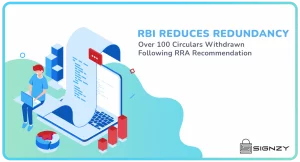What is RBI’s Master Direction (MD) on KYC?
The Master Direction (MD) on KYC is a set of guidelines issued by the Reserve Bank of India (RBI) to regulated entities (REs) on the conduct of customer due diligence (CDD). The MD on KYC is aimed at preventing money laundering and terrorist financing.
The MD on KYC sets out the following requirements for REs:
- REs must identify their customers and verify their identity. This can be done by collecting and verifying the customer’s name, address, date of birth, and other identifying information.
- REs must understand the nature of the customer’s business and the source of their funds. This can be done by asking the customer questions about their business and their sources of income.
- REs must conduct enhanced due diligence for high-risk customers. This includes politically exposed persons (PEPs) and those who are residents in high-risk jurisdictions.
- REs must monitor customer accounts for suspicious activity. This includes transactions that are large, unusual, or appear to be linked to money laundering or terrorist financing.
- REs must report suspicious activity to the Financial Intelligence Unit of India (FIU-IND). The FIU-IND is India’s central agency for receiving, processing, analyzing, and disseminating information relating to suspected or actual instances of money laundering or terrorist financing.
The MD on KYC is an important tool in the fight against money laundering and terrorist financing. The requirements set out in the MD on KYC help REs to identify and verify their customers, understand the nature of their customer’s business and the source of their funds, and monitor customer accounts for suspicious activity. These requirements help to make it more difficult for criminals to launder money or finance terrorism through REs.
The Key Changes by RBI to Master Direction on KYC
The Reserve Bank of India (RBI) has amended its Master Direction (MD) on KYC to strengthen customer due diligence (CDD) and risk-based monitoring requirements for regulated entities (REs). The amendments, which came into effect on May 10, 2023, are aimed at preventing money laundering and terrorist financing.
The key changes to the MD on KYC include:
- Enhanced customer due diligence (CDD) requirements: REs will now be required to conduct enhanced CDD for high-risk customers, including politically exposed persons (PEPs) and those who are residents in high-risk jurisdictions.
- Risk-based monitoring requirements: REs will now be required to implement risk-based monitoring systems to identify and monitor suspicious activity.
- New reporting requirements: REs will now be required to report to the Financial Intelligence Unit of India (FIU-IND) certain types of suspicious activity, including wire transfers of more than Rs.50,000.
The amendments to the MD on KYC are a positive step in the fight against money laundering and terrorist financing. However, it is important to note that these changes are just one part of the solution. India needs to do more to combat these crimes, including strengthening its anti-money laundering and terrorist financing laws, improving its enforcement of these laws, and increasing public awareness of the risks of money laundering and terrorist financing.
Here are some of the benefits of the Amendment to the Master Direction (MD) on KYC by RBI:
- Enhanced customer due diligence (CDD) requirements: The enhanced CDD requirements will help to ensure that REs have a better understanding of their customers and their customers’ financial activities. This will make it more difficult for criminals to launder money or finance terrorism through REs.
- Risk-based monitoring requirements: The risk-based monitoring requirements will help REs to identify and monitor suspicious activity. This will help to prevent money laundering and terrorist financing before it happens.
- New reporting requirements: The new reporting requirements will help the FIU-IND to identify and investigate potential cases of money laundering and terrorist financing. This will help to disrupt and dismantle criminal networks.
How Signzy’s KYC Solution streamlines with the RBI’s Master Direction on KYC?
Signzy’s KYC solution is a powerful tool that can help financial institutions to comply with KYC regulations and reduce the risk of money laundering and terrorist financing.
Here are some of the benefits of Signzy’s KYC solution:
- It is comprehensive and automated: Signzy’s KYC solution automates the process of collecting and verifying customer information, transaction monitoring, and reporting. This can help financial institutions to save time and money, and to reduce the risk of human error.
- It is compliant with international standards: Signzy’s KYC solution is aligned with international standards for combating money laundering and terrorist financing. This helps financial institutions to comply with these standards and avoid the penalties that can result from non-compliance.
- It is easy to use: Signzy’s KYC solution is easy to use and can be integrated with existing systems. This makes it easy for financial institutions to implement the solution and to start benefiting from its features.
- It is affordable: Signzy’s KYC solution is affordable and can be customized to meet the needs of financial institutions of all sizes. This makes it a cost-effective solution for financial institutions looking to improve their KYC compliance.
Final Thoughts
The RBI’s Master Direction (MD) on KYC is an important tool in the fight against money laundering and terrorist financing. The requirements set out in the MD on KYC help REs to identify and verify their customers, understand the nature of their customer’s business and the source of their funds, and monitor customer accounts for suspicious activity. These requirements help to make it more difficult for criminals to launder money or finance terrorism through REs.














